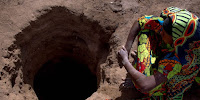The global humanitarian system, designed to save those at risk of dying because of human or natural disasters, faces unprecedented demands in 2016 from levels of strain it has never before had to face, a leading development agency says.
With more than 10 million people in a single African country expected to need international help next year, Oxfam says the effects of a super El Niño will intensify the pressures on a system already struggling to help people devastated by conflict.
If governments act now, Oxfam says, relief can reach those in the greatest need while there is still time. But if they don’t the crisis will overwhelm it and its counterparts who provide relief, and they will not be able to save those at risk.
Oxfam estimates the El Niño weather system could leave tens of millions of people facing hunger, water shortages and disease next year, and says it is already too late for some regions to avoid a major emergency.
...
Two million people across Guatemala, Honduras, El Salvador and Nicaragua already need food aid after drought and erratic rains. With floods expected in Central America in January, the situation is likely to deteriorate further.
Oxfam says governments and donors could be acting now to help people cope with drought or flooding, for example by conserving soil and water, reducing livestock, and ensuring the early treatment of malnutrition. A recent study by the UK government’s department for international development (DfID) found that on average these kinds of measures cut the cost of responding to an emergency by 40% per person.
El Niño is a natural phenomenon that occurs in the eastern Pacific roughly every seven to eight years. It takes its name from the Spanish term for the infant Christ, because it was observed in South America around Christmas. It can affect countries thousands of miles away.
Although El Niño is not directly caused by climate change, Oxfam says, global warming makes it more likely that strong El Niños will develop. And, in turn, El Niños involve the release of a large amount of heat from the Pacific, exacerbating climate change.
Read more at El Niño and War Drive Aid Agencies to the Brink

No comments:
Post a Comment